News
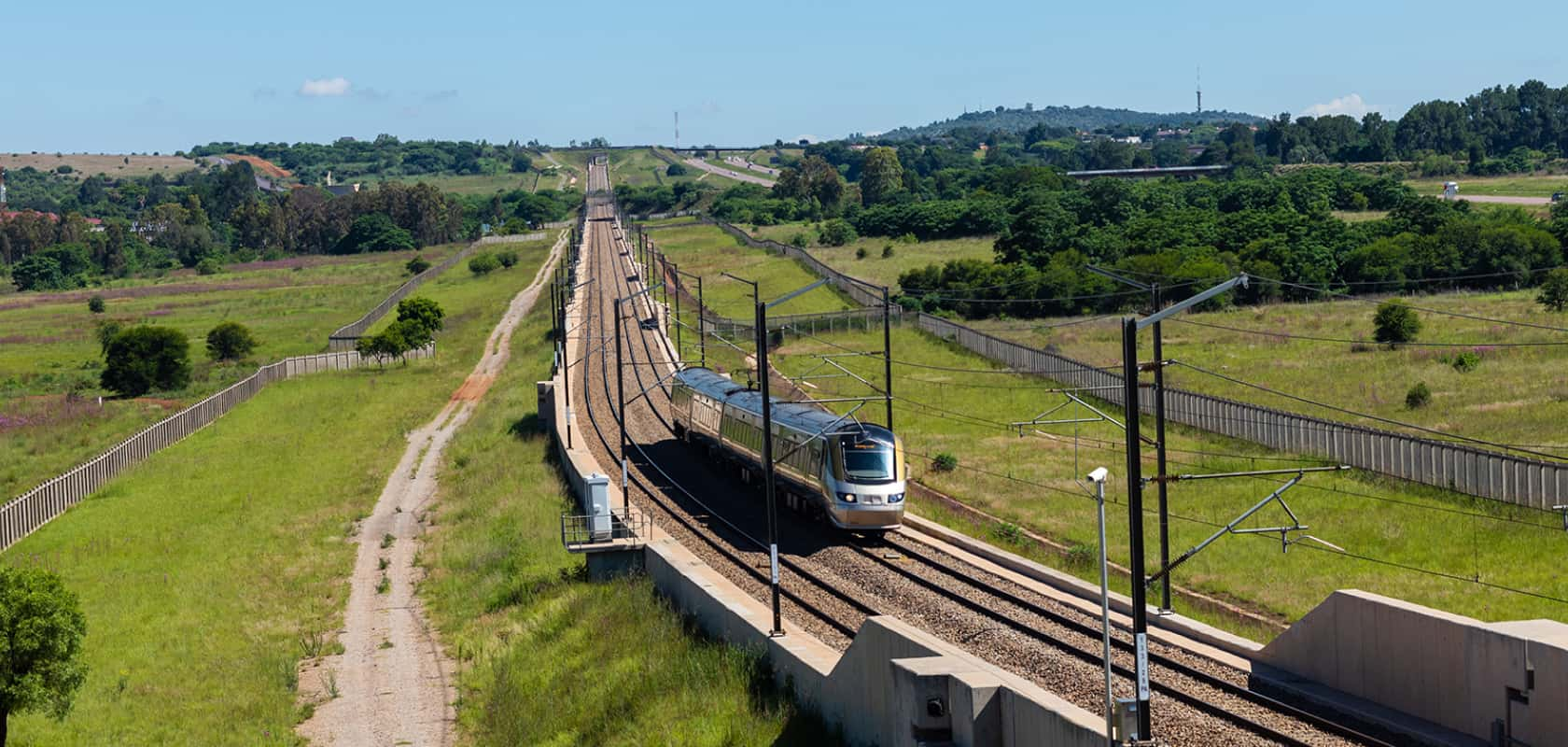
Featured News
Afreximbank and Thelo DB renew partnership for the development of railways in Africa Read more
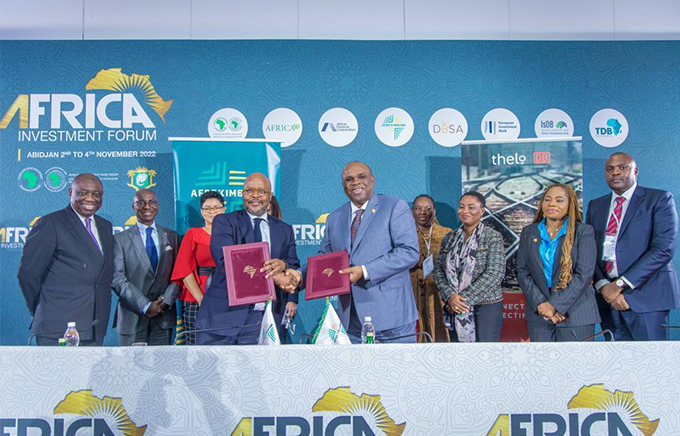
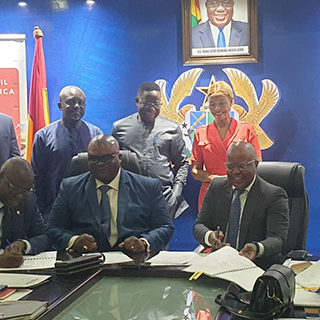
Thelo DB Consortium and the Government of the Republic of Ghana signed a 25 year Rail Management Agreement...

The role of railways in empowering AfCFTA’s success
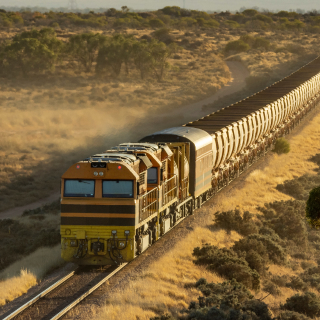
Tackling Africa’s rail infrastructure deficit
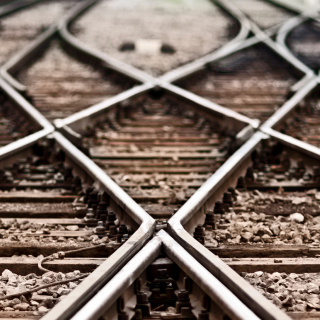
How railways can drive Africa’s economic development
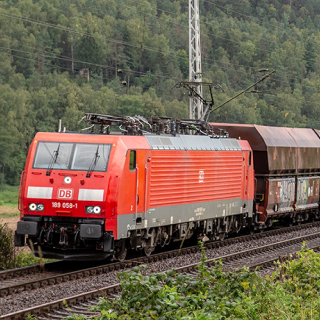
Africa’s railways and ESG
Afreximbank and Thelo DB renew partnership for the development of railways in Africa
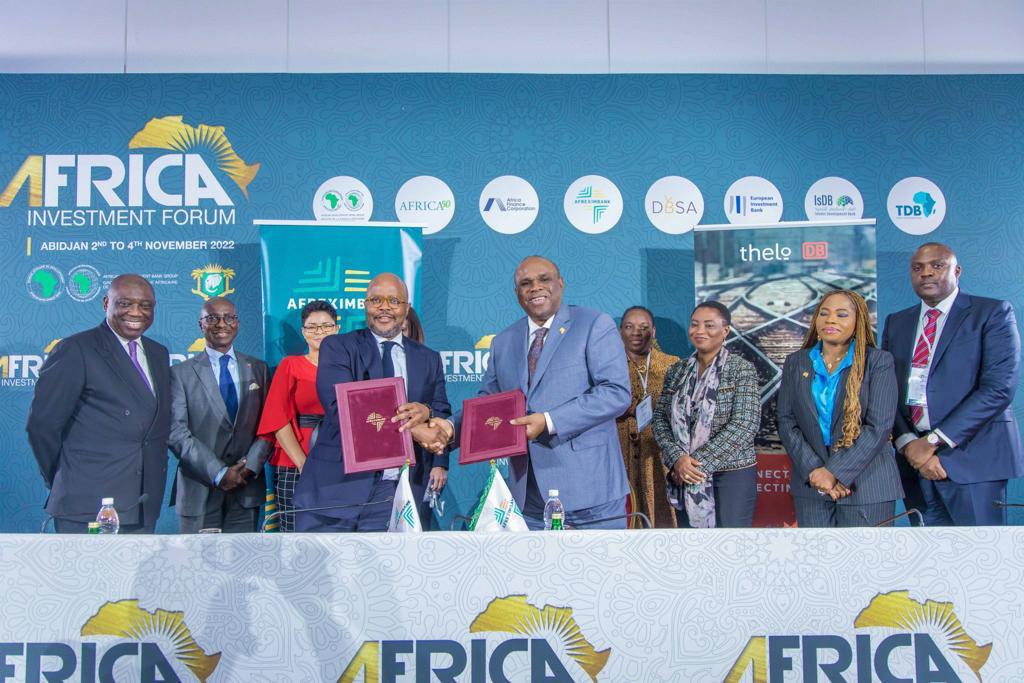
Abidjan, Cote d’Ivoire, 23 November 2022 – African Export-Import Bank (Afreximbank) renewed a partnership agreement with South Africa-based Thelo DB Proprietary Limited (Thelo DB), signing a memorandum of understanding (MoU) to support railway corridor and network development, operations, including the opportunity to expand infrastructure and enhance operational efficiencies of existing networks. The MoU, which was first entered into in 2019, aims to promote trade and investment flows on the continent through coordinated intervention in Africa’s railway sector.
The MoU was signed on the side-lines of the recently concluded Africa Investment Forum 2022 (AIF) in Abidjan, Cote d’Ivoire.
Under the terms of the MoU, Thelo DB will review each railway project from a technical perspective and provide technical solutions. Afreximbank will consider the diagnostic technical and feasibility analysis undertaken by Thelo DB and based on that propose financial and advisory solutions to the owners of the railway infrastructure.
In the past 3 years, Afreximbank and Thelo DB have obtained an in depth understanding of the railway ecosystem on the continent that has culminated in the development of a bespoke first-of-a-kind railway solution well suited to the continent’s railway needs. This solution is being deployed in Ghana to develop the Western Railway Corridor project under a Railway Management Agreement executed on 22nd August 2022.
Under the MoU, Afreximbank and Thelo DB intend to replicate and rollout this solution across the continent.
Mr. Ronnie Ntuli, Chairman of the Board of Directors of Thelo DB said:
“We are both proud and excited to renew our Memorandum of Understanding with African Export Import Bank. This signing provides Thelo DB with the unique opportunity to further deepen our working relationship with Africa’s pre-eminent trade finance institution and thus provide integrated technical and financing solutions for development of the continent’s railway sector on a sustainable basis. In turn, the partnership presents a much-needed intervention for infrastructure development, freight and passenger transportation solutions, trade, training and skills transfer, economic development, and regional integration.”
Speaking at the signing ceremony, Prof. Benedict Oramah, President & Chairman of Afreximbank commented:
“Today’s renewal of the MoU signed three years ago between Afreximbank and Thelo DB is a reaffirmation of our joint commitment to engineer fit-for-purpose technical and financial solutions that will address the shortcoming of the railway sector in Africa which has been undermined by inadequate capital structure, inappropriate route designs, and operational inefficiencies. With this partnership, we will develop a blueprint that can be replicated across the continent through an integrated railway model that constitutes a paradigm shift away from the traditional railway construction approach. As such, we at Afreximbank intend to advance this novel approach alongside our partner, Thelo DB, by deploying the full suite of financial instruments at our disposal to facilitate the implementation of technically feasible and financially viable railway solutions in a timely manner.”
- Ends -
About Thelo DB
Thelo DB is an African railway company incorporated between Thelo, an African industrial group and DB E&C, a subsidiary of Germany’s Deutsche Bahn (DB), which is one of the world’s leading fully integrated railway conglomerates. Thelo DB has the skills, capacity, experience, and expertise to develop, implement and support complex railway projects and brings global experience and capacity to the African railway market. The company supports the development of new railway corridors, the enhancement of operational efficiencies in existing networks and is able to support railway sector reform.
Thelo DB provides unique solutions to current and prospective railway infrastructure projects to nation states, regions, developers, financiers, and existing operators within the sub-Saharan region of Africa. The group places particular emphasis on Transportation and Logistics and, more specifically, railway projects. Thelo DB’s long-term vision is to deliver rail for freight and passengers via a holistic, fit-for-purpose model for the continent. The company aims to advance economic development of the continent by turning its fully integrated model into key outcomes:
- Delivering railway corridors and networks on the African continent;
- Building the capacity of African national railway operators;
- Training African talent into key roles across various railway functions; and
- Being the partner-of-choice for those who share in its vision for a holistic approach, capacity building and high impact railway development.
For more information, visit www.thelodb.com
About Afreximbank
African Export-Import Bank (Afreximbank) is a Pan-African multilateral financial institution mandated to finance and promote intra-and extra-African trade. Afreximbank deploys innovative structures to deliver financing solutions that support the transformation of the structure of Africa’s trade, accelerating industrialization and intra-regional trade, thereby boosting economic expansion in Africa. A stalwart supporter of the African Continental Free Trade Agreement (AfCFTA), Afreximbank has launched a Pan-African Payment and Settlement System (PAPSS) that was adopted by the African Union (AU) as the payment and settlement platform to underpin the implementation of the AfCFTA. Afreximbank is working with the AU and the AfCFTA Secretariat to develop an Adjustment Facility to support countries in effectively participating in the AfCFTA. At the end of 2021, the Bank’s total assets and guarantees stood at about US$25 billion, and its shareholder funds amounted to US$4 billion. Afreximbank disbursed more than US$51 billion between 2016 and 2021. The Bank has ratings assigned by GCR (international scale) (A), Moody’s (Baa1), Japan Credit Rating Agency (JCR) (A-) and Fitch (BBB). The Bank is headquartered in Cairo, Egypt.
For more information, visit: www.afreximbank.com.
Thelo DB Consortium and the Government of the Republic of Ghana signed a 25 year Rail Management Agreement to develop and operationalise the 299 km Western Railway Line
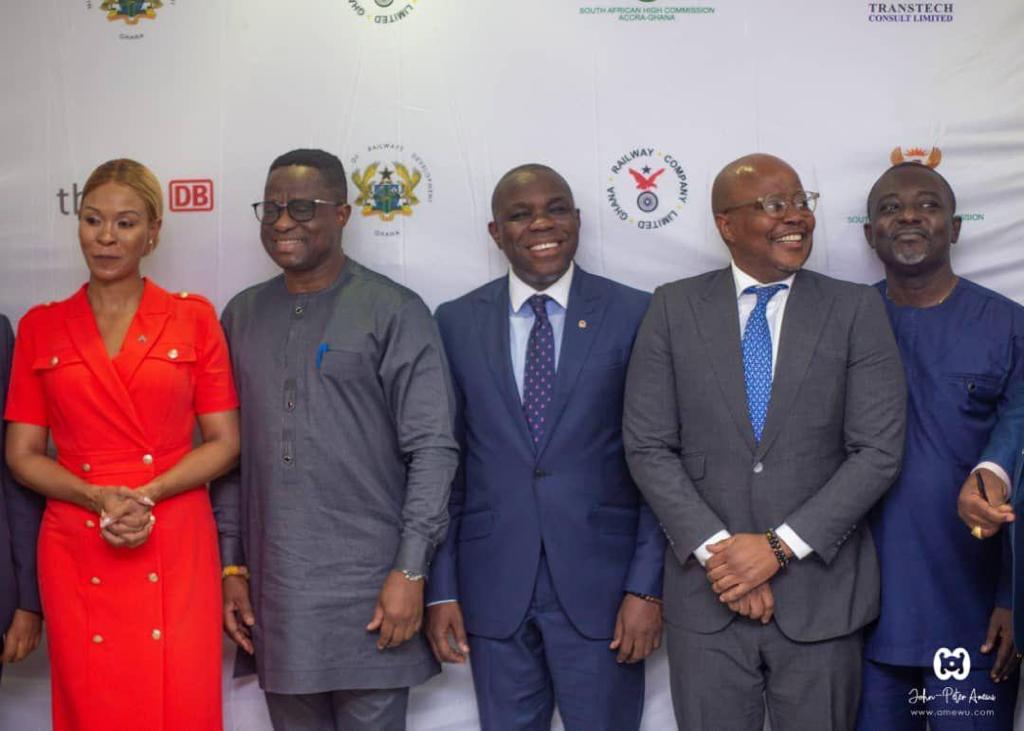
Thelo DB Consortium and the Government of the Republic of Ghana signed a 25 year Rail Management Agreement to develop and operationalise the 299 km Western Railway Line
Johannesburg, 29 August 2022: The Thelo DB consortium (consisting of Thelo DB and Transtech Consult Limited) has signed a Rail Management Agreement with the Government of the Republic of Ghana through the Ghana Railway Company Limited, to develop and operationalise the Western Railway Line. The Signing Ceremony for the US$3.2 billion project took place in Accra, Ghana on 22 August 2022.
The project includes Planning (all project preparation-related activities, such as feasibility studies, demand analysis, preliminary and detailed design, and procurement consulting); Implementation (systems engineering design, construction supervision, design review, audit systems engineering, testing and commissioning of rolling stock and infrastructure); and Operations and Maintenance Management (early train operator, consulting services in terms of infrastructure operations, rolling stock operations, infrastructure and rolling stock maintenance).
When completed, the project, which includes the associated infrastructure, training and Operations and Maintenance Management, will transform Ghana’s existing rail network into a modern, robust and integrated railway system running from the Port of Takoradi to Huni Valley to Obuasi, including the branch line from Dunkwa to Awaso to Nyinahin and to Eduadin.
The investment for the Ghana Western Railway Line Project will ensure that the rail infrastructure is upgraded and that there is interoperability of railway systems; new standardised rolling stock; required maintenance facilities; a spare parts regime and operational integration into other transport infrastructure and systems.
Hon. John-Peter Amewu, Minister of Railway Development, Ghana, commented: “Currently, the transportation of freight, including minerals and other bulk commodities along the Western Corridor is predominantly by means of the road network due to the poor state of the railways. The Western Railway Line has a very huge potential in terms of the haulage of both liquid and bulk cargo. For instance, current projected annual haulage on the Western Rail Line for manganese and bauxite is about 7 million and 15 million metric tonnes respectively. An additional 5 million metric tonnes of bauxite is estimated to be mined and transported annually from the new bauxite deposit at Nyinahin using the railway. The Bulk Oil Storage and Company Limited has also projected to haul over 1.5 billion litres of oil products along the corridor. Other commodities that are transported along the Western Corridor include Cocoa, Timber, Cement, among others which also have huge haulage potential based on their respective projected volumes. Rail transport is therefore critical to the success and achievement of all these traffic projections since it provides a cheaper and more efficient means of transporting such commodities.”
The fully integrated development model is an innovative one for Africa the railway sector especially because the Western Rail Line Project will be funded on a ring-fenced project finance basis.
This agreement is further testament to the importance that President Akufo-Addo’s government places on our railway sector.
Ronnie Ntuli, Chairman of Thelo DB, said: “The intention of this Project is to develop, implement and operationalise the Western Railway Line as a fully integrated railway system to enable efficient mobility of freight and passengers. This, will in turn, catalyse investment, infrastructure development, promote trade, skills development and job creation thereby generating broader economic growth in Ghana, and hopefully, the broader West Africa region.”
Mr. Ntuli praised the government of the Republic of Ghana, for identifying the railway sector and this project in particular as a catalyst for development, and the role of Ministry of Railway Development and the Ghana Railway Company, in operationalising the vision to develop and modernise Ghana’s hard and soft railway infrastructure systems.
About Thelo DB
Thelo DB is an African railway company incorporated between Thelo, an African industrial group and DB E&C, a subsidiary of Germany’s Deutsche Bahn (DB), which is one of the world’s leading fully integrated railway conglomerates. Thelo DB has the skills, capacity, experience, and expertise to develop, implement and support complex railway projects and brings global experience and capacity to the African railway market. The company supports the development of new railway corridors, the enhancement of operational efficiencies in existing networks and is able to support railway sector reform.
Thelo DB provides unique solutions to current and prospective railway infrastructure projects to nation states, regions, developers, financiers, and existing operators within the sub-Saharan region of Africa. The group places particular emphasis on Transportation and Logistics and, more specifically, railway projects. Thelo DB’s long-term vision is to deliver rail for freight and passengers via a holistic, fit-for-purpose model for the continent. The company aims to advance economic development of the continent by turning its fully integrated model into key outcomes:
- Delivering railway corridors and networks on the African continent;
- Building the capacity of African national railway operators;
- Training African talent into key roles across various railway functions; and
- Being the partner-of-choice for those who share in its vision for a holistic approach, capacity building and high impact railway development.
For more information, please visit www.thelodb.com
Tackling Africa’s rail infrastructure deficit
A well-functioning railway is widely recognized to be a driver of economic growth as it allows people to travel more widely for work and move goods between suppliers, manufacturers and customers reliably and efficiently. Additionally, in this era of increasing focus on environmental and climate issues, railways provide an impactful solution as a low carbon system of transport infrastructure as the least environmentally damaging way of moving large volumes of goods over long distances.
In cities, rail is unrivalled in its ability to transport large volumes of passengers and reduce congestion, while also being safer than road transport and significantly less damaging to air quality. Freight rail is an environmentally friendly alternative to long-distance inland road freight transport and high-speed rail is a low-carbon alternative to aviation for intra-continental trips.
Rail is one of the most energy-efficient transport modes, responsible for 9% of global motorized passenger movement and 7% of freight but only 3% of transport energy use (1). But Africa’s railways are operating from a low base compared to global standards. It is estimated that Africa has only 75,000 kilometers of rail - which is less than China has on its highspeed railway – while the US has over 250,000 kilometers of rail (2). When you consider that Africa is over three times the area of the US (at 30.37 million km2 and 9.15 million km2 respectively) but has less than a third of the rail network, it portrays the scale of Africa’s rail deficit.
It goes beyond just expanding Africa’s rail network, there is also the need to rehabilitate and modernize many of the existing legacy assets. Track components are aged; there are a lack of spare parts and a shortage of rolling stock, equipment and maintenance vehicles; signaling and telecom systems require replacing; there are inadequate maintenance/renovation programs; and rail infrastructure lacks uniformity. All these factors have safety and efficiency implications, while the network deficit and lack of capacity further impedes railways’ ability to fully compete with road haulage.
Cross-border trade freight via rail in some African countries is also handicapped by lack of connectivity and interoperability, while some railways consist of single track non-electrified networks, thus necessitating the use of diesel locomotives. Many of the rail networks are still operating to the standard at which they were built in the colonial era.
Interoperability is also constrained by the use of differing gauges in sub-Saharan Africa (SSA). Most use either Cape gauge or meter gauge, but there are also several standard gauge lines. For example, the metric gauge is the commonly operated gauge in the WAEMU region, making large axial loads on wagons and trains inoperable.
Most railways in SSA carry significantly more freight than passengers, with freight averaging over 90 percent of total traffic units and being dominated by bulk and semi-bulk commodities, principally to and from ports (3). To fully compete with road and air transport alternatives, rail needs to have reliable, low-cost service providers on key transport arteries and to interact seamlessly with road carriers for last mile delivery to the customer.
At Thelo DB we’re addressing these issues as an African railway entity incorporated between Thelo Group and Germany’s Deutsche Bahn E&C (DB), which is one of the largest, fully integrated railway companies in the world, providing customized and sustainable transport solutions using its global experience and capacity to Africa’s railway market, supporting the development of new railway corridors and enhancing the operational efficiencies of existing networks. We have the skills, capacity, experience and expertise to develop, implement and support complex freight and/or passenger railway projects of any scale in Africa. This includes concept through to design and engineering, financing, procurement, testing and commissioning, operations and maintenance, as well as skills development. Our capabilities include urban passenger rail, regional and long-distance passenger rail, freight rail and all associated infrastructure, such as track and network, signaling and telecommunications, depots, stations and civil structures, energy and power.
Our sister company, Thelo Rolling Stock, is the pre-eminent financier of rolling stock – locomotives, freight wagons, fuel tankers and passenger cars – for rail operators, concession holders and freight owners in Africa, providing customers with effective, reliable, high-quality equipment. It sources its equipment from local and international manufacturers and its partnerships include Transnet Engineering, General Electric / Wabtec, Grindrod and National Railway Equipment. It also ensures that its partners establish workshops, supply chains and training for maintenance in the countries where the rolling stock is deployed, thus transferring skills, as well as creating and preserving jobs for Africans.
(1) Tracking Rail 2020 – Analysis - IEA
(2) A look at the future of railway technology in Africa - ASME
(3) World Bank Document
How railways can drive Africa’s economic development
The transport sector is a vital facilitator in the acceleration of trade across Africa. For land-based transport – railways are ideal for mass transit in and around urban areas and for transporting freight over long distances. It has significant advantages over road and aviation for many factors including safety, energy efficiency, lower emissions, reduced congestion and lower costs of delivery per kilometer. It does, however, need efficient partnerships with road freight for last mile delivery.
Outdated rail network
As is well documented, Africa’s rail infrastructure, network and rolling stock requires massive investment to bring it up to world standards and to fulfil its potential. It needs massive extension of its network, connectivity and capacity, modernization, rehabilitation, improved maintenance, modern communications, better supply and stocks of spare parts and more rolling stock, maintenance vehicles and equipment. Further, interoperability is impeded both by the differing gauges in use and the incidence of many single track non-electrified networks, with the latter requiring diesel locomotives.
AfCFTA incentivisation
With the African Continental Free Trade Area (AfCFTA) progressively removing tariffs and addressing non-tariff trade barriers, the UN Economic Commission for Africa predicts that it will increase intra-African trade by about 40% (1). Unsurprisingly, this would also significantly increase traffic flows and transport equipment needs across road, rail, shipping and aviation.
Catching up to what is needed is a tall order, but so too is a change in mindset. Africa’s population – and therefore consumer demand – is rapidly growing, while the gathering momentum of urbanization continues to accelerate, as does the demand for industrial parks, special economic zones and ports. These structural changes need to be accompanied by an ecosystem development approach. It shouldn’t just be about building the new industrial park, factory or whatever. To realize maximum potential, they also need the social and economic infrastructure – the residential housing, shops, schools, doctors, power, telecoms, ICT, water supply and sanitation, roads, rail and more.
Identifying the rail projects and requirements
ALG, a global consultancy focused on transportation, infrastructure and logistics, deems (2) the areas in Africa most appropriate to railway projects to be:
- Major African metropolises – urban and suburban passenger railways;
- Densely populated areas and corridors – high volumes for freight or passengers possible;
- Corridors from ports to inland markets – freight trains moving containerized or bulk materials from/to ports over long distances; and
- Major mining basins – freight trains moving minerals and other raw materials to export ports.
A 2020 report(3) by the World Bank stated that railways need to be ‘reliable, low-cost service providers on key transport arteries and interact seamlessly with road carriers to deliver door-to-door service to the customer … critical hubs must be developed to consolidate freight. They need to be located to be convenient for the customers (not just the railway) and the overall transport service needs to be tailored to the particular requirements of individual customers or groups of customers. Many railways in sub-Saharan Africa are locating container hubs in inland cities. The railway typically moves the containers between the hub and a port, and the hub may also be a dry port offering customers clearance services.’
Further, the World Bank report forecast that the renaissance and transformation of sub-Saharan Africa’s railways requires the implementation of three elements – good governance, adequate funding and building traffic – to enable them to contribute to economic growth in a climate-friendly way and to enhance transport to improve lives.
Indeed, for Africa’s 17 landlocked countries, their economic development is especially reliant upon efficient freight transport corridors with sufficient capacity to link them to maritime ports and other countries.
Gaining market share from road freight
Currently the majority of on-land African freight transport is carried by road, emphasizing the potential for rail, especially for long distance deliveries. Over the 14-year period 2006 to 2019, annual African rail freight carried remained in the range of 131.08 to 156.97 billion tonne kilometers (4).
To redress the balance and attract greater market share – when the rail network and capacity is in place – Africa’s railways need to compete on transport cost (including last mile), delivery time, service frequency and reliability. With sufficient investment the prize is there.
Thelo DB is ideally positioned to meet the challenges and provide the solutions to Africa’s railway network, infrastructure and operational needs. We have the skills, capacity, experience and expertise to develop, implement and support complex freight and/or passenger railway projects across Africa, from concept through to design and engineering, financing, procurement, testing and commissioning, operations and maintenance, as well as skills development. Our capabilities include urban passenger rail, regional and long-distance passenger rail, freight rail and all associated infrastructure, such as track and network, signaling and telecommunications, depots, stations and civil structures, energy and power. Additionally, our sister company, Thelo Rolling Stock can finance the rolling stock to provide customers with effective, reliable, high-quality equipment, as well as ensuring that workshops, supply chains and training for maintenance are available in the countries where the rolling stock is used.
Railways have high fixed costs, particularly in respect of infrastructure, but comparatively low variable costs, thus positioning them favorably for dense traffic flows. There is no doubt that Africa’s railways can play a major role in the facilitation of trade and economic development, but significant investments are needed, and the resultant capacity needs to be utilized. In the words of Lalu Prasad Yadav: “Wagon is the bread-earning horse of the Railways. Load it adequately. Make it run and don't stable it.”
(1) African Continental Free Trade Area (AfCFTA) to significantly increase traffic flows on all transport modes | United Nations Economic Commission for Africa (uneca.org)
(2) Rail Infrastructure in Africa – Shaping Future (algnewsletter.com)
(3) World Bank Document
(4) Rail freight traffic: Africa 2019 | Statista
Africa’s railways and ESG
There is no getting away from the fact that physical goods need transporting, whether it’s the components or ingredients for a product across the supply chain which need to get to the finished product manufacturer, and from there to the distributor, retailer and ultimately to the end consumer. Logistics and transport have an essential role to play. People also need to travel whether it’s to work, or for domestic, social or leisure reasons. In terms of commercial freight deliveries, the choices mainly center around road, rail, air and boat.
High transport costs and the need for infrastructure investment
However, a report from Rand Merchant Bank suggests that the cost of transportation in Africa is about 50-175% higher on average than in other parts of the world because of poor road, rail and port transportation infrastructure. Taking just one example in Africa, it is possible to significantly reduce container transportation costs by constructing standard gauge railway (SGR) lines for freight cargo services – the 472km SGR line in Kenya linking the Port of Mombasa to Nairobi in 2017 reduced the cost of transporting a 20ft container by 50% (1).
In respect of rail, there is the need to improve connectivity and substantially expand the network – Africa is over three times the size of the US but has less than a third of the rail network. Also, much of the existing and often ageing legacy assets require rehabilitation and modernization. Interoperability issues from differing gauges need to be addressed, as do single track non-electrified networks requiring diesel locomotives, the lack of spare parts and the shortage of rolling stock, equipment and maintenance vehicles to fully compete with road haulage.
Rail is environmentally friendlier
From an environmental perspective, railways have substantial advantages over road, air and maritime transport. Rail has a key role in decarbonizing transport. It is the cleanest and greenest high-volume transport mode and one of the most energy efficient. Rail accounts for 8% of global passenger and freight transport activity (in passenger km/tonne km), but railways produce only 2% of the transport sector’s emissions. Global Green House gas emissions from transport are continuing to rise – they accounted for 14% of all emissions in 2018, but rail was the only mode to reduce its emissions, down by 2% between 2000 and 2018 (2). Indeed, trains are on average three to four times more fuel efficient than trucks – producing up to 75% fewer GHG emissions (3), while the EU found that European railways are up to 9 times less CO2 intensive than road for freight (4).
In cities, rail is unrivalled for mass transit of passengers, and it also reduces congestion, is safer and significantly less damaging to air quality than road transport. Freight rail for moving large volumes of goods over long distances is an environmentally friendly alternative to long-distance inland road freight transport and high-speed rail is a low-carbon alternative to aviation for intra-continental trips.
The sustainability target
The International Union of Railways (UIC) announced its Sustainability Pledge (5) in 2021, which in addition to targeting a market share for rail of 25% by 2050, is also targeting carbon neutrality for African rail by 2050 through:
- Delivering innovative solutions to increase energy efficiency and phase out diesel services;
- Prioritizing renewable energy sources;
- Working together as a region to share best practice and common solutions;
- Embedding circular economy principles to help combat resource depletion and the impacts of material and waste production: recycling and reusing end-of-life products in all processes associated with railway activity; and
- Integrating an eco-design approach during the study, design and development project phases of new infrastructure.
When deciding upon and allocating capital to railway projects, cash flow shouldn’t be the only consideration, as social, economic and environmental factors should also be taken into account. For example, a commuter railway will reduce travel time, congestion, accidents, greenhouse gas emissions and noise pollution, while also creating employment, increasing social equality – everyone will use it regardless of status – and contributing to urban regeneration. Using such a lens may also make it easier to raise funding from development finance institutions and even financiers, who are increasingly insisting on social and environmental considerations to be cornerstones of projects.
Thelo DB
Thelo DB is an innovative and progressive African railway entity incorporated between Thelo Group and Germany’s Deutsche Bahn E&C (DB) – one of the largest, fully integrated railway companies in the world. Thelo DB provides customized and sustainable transport solutions by combining its global experience with local capacity to develop railways that are fit-for-Africa. Its aim is to shift the paradigm for African railway to a holistic, fully integrated model – and as such supports the development of new corridors as well as enhancing the operational efficiencies of existing networks. It has the skills, capacity, experience and expertise to develop, implement and support complex freight and/or passenger railway projects of any scale in Africa, from concept through to design and engineering, financing, procurement, testing and commissioning, operations and maintenance management, with a strong emphasis on skills development and job-creation. Thelo DB’s capabilities include urban passenger rail, regional and long-distance passenger rail, freight rail and all associated infrastructure, such as track and network, signaling and telecommunications, depots, stations and civil structures, energy and power. In addition, its sister company, Thelo Rolling Stock, is the pre-eminent financier of rolling stock – locomotives, freight wagons, fuel tankers and passenger cars – for rail operators, concession holders and freight owners in Africa, providing customers with effective, reliable, high-quality equipment.
(1) Feature: Modern railways and the route to boosted growth in Eastern Africa | Supply Chain Digital
(2) Sustainability | UIC - International union of railways
(3) csx_esg_report_final_7_30.pdf (q4cdn.com)
(4) Green Finance and Sustainability: Which Role for Railways? - Florence School of Regulation (eui.eu)
(5) sustainable-railways-africa-pledge.pdf (uic.org)
The role of railways in empowering AfCFTA’s success
Trading under the African Continental Free Trade Area (AfCFTA) commenced in January 2021, creating a huge single market of 54 African states – all but Eritrea – of almost 1.4 billion people. It’s a game changer for Africa with the UN Economic Commission for Africa (UNECA) estimating (1) that AfCFTA has the potential both to boost intra-African trade by 52.3% by eliminating import duties, and to double this trade if non-tariff barriers are also reduced’.
Jettisoning the trade barriers
Prior to the AfCFTA, cross-border African trade was impeded by average tariffs of 6.1%, often absurdly making it more expensive to export within Africa than outside it. As the AfCFTA progressively eliminates tariffs and addresses non-tariff barriers, it will deliver Africa’s businesses with a golden opportunity to increase intra-African trade. They will also benefit from both the availability of a larger workforce and consumer-driven demand growth as Africa’s population is predicted to grow to 2.5 billion by 2050. The latter will give Africa 26% of the world’s working age population and potentially double its economic growth compared to that of the developed world. Experts predict that Africa’s industrial exports will benefit more from the AfCFTA than the likes of oil and minerals, suggesting an economic alignment towards a more diversified, balanced and sustainable export base.
Africans’ love affair with mobile phones and digitalization will further fuel cross-border trade as ecommerce continues its upward trajectory.
Logistics and transport are key facilitators
These trade transformations will inevitably herald and necessitate increased demand for the logistics and transport necessary to physically move all the components/inputs from across the supply chain to the finished goods manufacturers and the goods sold from there to the distributors, buyers or traders to the ultimate users.
Improving and developing Africa’s rail capacity and network is key to facilitating trade and optimizing the success of the AfCFTA. Rail has innate advantages over other transport options for long-distance inland road freight and mass-transit passenger journeys for a range of reasons including efficiency, cost, safety, air quality, environmental considerations, reduced congestion and potential capacity. It is also critical for connecting landlocked countries to seaports. An effective transport system will enhance African competitiveness, reduce transport and logistics costs, improve market accessibility, ease integration into regional and global value chains and drive economic growth and development. Nigeria’s Minister of Transportation, Rotimi Amaechi, said “The transportation sector is the most critical in implementing trade facilitation, enhancing regional integration and key to every other AfCFTA protocol. Transportation and AfCFTA are like Siamese twins as they are intricately linked. Transportation provides the vehicle through which the major objective of AfCFTA thrives; that is, creating a single continental market for goods and services with free movement of businesses, persons and investments, promoting regional and continental integration, market access and resources reallocation across sectors and countries.”
A 2013 report (2) by KPMG stated that ‘transport prices are estimated to be anywhere from 50 to 175% higher in Africa than global averages and eat up more than 20% of foreign export earnings; ports and rail links are overcrowded; and in some countries roads are impassable. All told, the lack of adequate infrastructure is estimated to cut productivity across the continent by as much as 40%.’
Rail can deliver if it gets the investment needed
Indeed, UNECA (3) expects the AfCFTA to increase transport services by almost 50% although maximizing these gains will require significant regional infrastructure projects, with road, rail, air and maritime all benefiting. UNECA believes that the ‘AfCFTA provides an opportunity to build Africa’s railway network. It would increase intra-Africa freight demand by 28%; (although) demand for maritime freight will increase the most.’ Cognizant that Africa’s rail network is inadequate, if planned rail projects are implemented the rail network would increase by nearly 26,500 km. UNECA forecasts the AfCFTA will require 97,614 wagons for bulk cargo and 20,668 wagons for container cargo by 2030. This would increase to 132,857 and 36,482 wagons respectively if planned infrastructure projects are implemented.
Much of Africa’s existing rail network is outdated and inefficient, with inadequate maintenance, insufficient spare parts, equipment and rolling stock, aged signaling and communication systems that urgently need replacing, and interconnectivity issues caused by the use of differing gauges across the continent. Vast investments are required to rehabilitate and modernize the existing network, and so too to finance its expansion with new lines to better connect countries, industrial zones, urban areas, new corridors, ports, the implementation of high-speed rail and more.
Thelo DB has the skills, capacity, experience and expertise to develop, implement and support complex freight and/or passenger railway projects across Africa, from concept through to design and engineering, financing, procurement, testing and commissioning, operations and maintenance, as well as skills development. Our capabilities include urban passenger rail, regional and long-distance passenger rail, freight rail and all associated infrastructure, such as track and network, signaling and telecommunications, depots, stations and civil structures, energy and power.
Additionally, Thelo Rolling Stock can finance the rolling stock which will provide customers with effective, reliable, high-quality equipment, as well as ensuring that workshops, supply chains and training for maintenance are available in the countries where the rolling stock is used.
Africa has a combination of unique factors in its favor that, when grasped and capitalized upon, will transform the continent’s economic growth, industrialization and diversification to become a globally competitive powerhouse. The AfCFTA is a major driver of this momentous journey, but it will need the development of world-class facilitating logistics and transport infrastructure – including the rail sector – if it is to deliver on its full potential.
(1) qa_cfta_en_230418.pdf (uneca.org)
(2) INSIGHT: The global infrastructure magazine / Issue No. 4 / 2013 (home.kpmg)
(3) AfCFTA: Africa’s transport sector to benefit from free trade | Africa Renewal (un.org)
